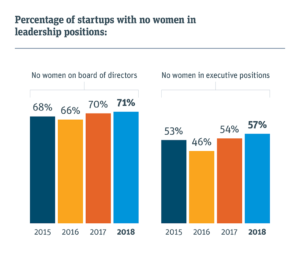
Image: respectwomen.co.in
On International Women’s Day, we think it appropriate to review how women are doing in the fastest growing sector of the US economy – high tech startups. The results of a Silicon Valley Bank survey for 2017 are not good. There were no women board members in 70 % of Silicon Valley startups, actually up from 2016. Women were poorly represented in 54 % of startups with no executive positions filled by women in 2017.

Source: Silicon Valley Bank – 2017 (2018 figures are estimates)
Why? Having built a career in Silicon Valley for the last 25 years this author has seen a number of reasons – none really acceptable for the trend. It starts first in school, STEM programs to bring along girls in secondary school and then science and technology in college are few and poorly funded considering women represent 51 % of the population. In college, the men often start companies in dorms like CISCO at Stanford, or school buddies as the founders of Google at the Stanford School of Engineering. Universities are key incubators or engineering and high tech startups, with a low percentage of women in engineering programs there were fewer to start with to be founders. In the venture funding world, venture capitalists seek other men that they know of in graduate school departments, or grad students they know for tips on interesting new technologies. There is cultural network for men related to high tech startups that continues to grow and keep men in the mainstream. Plus, most venture capitalists are men, and don’t feel as comfortable giving many women funding, not trusting their judgement or skills is almost an unconscious response.
Next Steps:
What do we do about it? Diversity programs are a start, the Silicon Valley Bank survey did find that 41 % of startups up from 25% the previous year had started active women recruitment programs. More funding for STEM programs specifically focused on girls in grade schools with a focus on both the skills as an engineer but also the cultural aspects of a women in engineering. Many engineering environments in startups are hostile to women and keep growing with a ridiculing attitude toward women. One former manager at a $1B company in San Francisco told this author, “working in this place is like being in the boys’ locker room”. From STEM and engineering programs in college women need specific programs in incubators and founder support groups like the Women’s Founders Network. When more women start companies they will change the culture into a more robust, open and adult environment. Women on boards and in executive positions will shift HR policies in startups and small companies to be more family friendly, more flexible time for family issues as they arise and more supportive of women re-joining the workforce from having a baby or taking care of a family for many years.
There is no better day than today for men to realize many times, “The best man for the job is a woman!”
